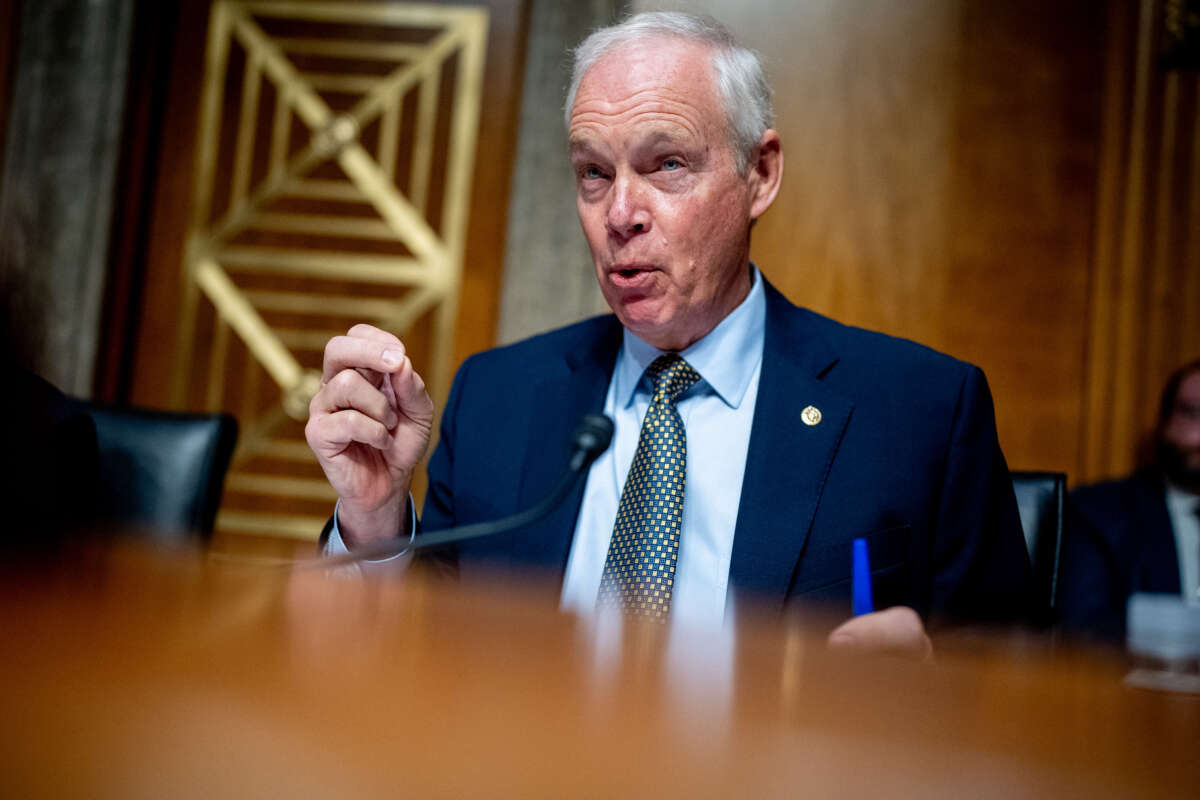United States Sen. Ron Johnson (R-Wisconsin) is downplaying concerns that access to in vitro fertilization (IVF) is being threatened by far right lawmakers, claiming that Democratic lawmakers trying to pass a bill to protect IVF are “falsely push[ing] fear” to garner votes in the 2024 election.
“IVF, access to it, is not under threat anywhere,” Johnson told PBS Wisconsin on Monday, an assertion that has been disputed by reproductive rights experts.
In his comments, Johnson discussed a decision from the Alabama Supreme Court earlier this year in which justices cited the state’s standards on “fetal personhood” to rule that embryos deserved the same political rights as children, resulting in IVF treatments across the state being paused. Johnson falsely claimed that the case had been fully resolved.
“[The] Alabama legislature corrected that and reinstated their ability in Alabama to have IVF,” Johnson said.
Although the state passed a law that exempts IVF clinics from being held to the standard established by the state Supreme Court, it’s feasible that a challenge to that law could result in the court ruling that IVF clinics are no longer constitutionally exempt. Even the sponsor of that legislation admitted that the law was just a “temporary fix.”
Johnson’s comments ignored the fact that IVF is still only marginally protected in Alabama. Ten other states in the country have the same “fetal personhood” standards that Alabama’s top court used to upend access to IVF — and it’s possible they, too, could face anti-IVF rulings in the future. Meanwhile, around a dozen additional states are also considering enacting fetal personhood standards.
“You can get IVF in every state. It’s not under any threat,” Johnson ranted on. “This is, again, this is a made up issue.”
The Wisconsin Republican senator claimed that any legislation seeking to protect IVF was simply trying to “scare” people into thinking the GOP is “going to take away their IVF or their contraceptive.”
“I support IVF, I just don’t, I’m just not gonna go along with the fearmongering,” Johnson added.
Reproductive rights experts and advocates largely disagree with Johnson’s assertions, noting that fetal personhood laws could limit people from being able to access IVF treatments. Such laws also restrict aspects of people’s reproductive health beyond IVF, they warned.
“There are personhood laws that exist in multiple states around the country that are not being effectuated to their full extent,” Dana Sussman, deputy executive director at Pregnancy Justice, said to NPR in March when the Alabama Supreme Court issued its ruling. “The concern that we have here is that, whether it’s prosecutors [or] whether it’s litigants, [they] will start to use those laws to criminalize self-managing abortion, criminalize pregnancy loss, criminalize behavior during pregnancy, go after IVF in the way that we saw in this civil case or criminally, too. … And so that is sort of the sleeping threat that lingers in a lot of these states.”
“The way I see it, once any element of this is criminalized or once the fetus is defined as a person in any area of law, criminalization [against pregnant people] is the next step and it is not hard to do,” Grace Howard, an associate professor of Justice Studies at San Jose State University, told NPR about the matter.
Lauren Rankin, an abortion rights activist and author, penned an op-ed for Truthout earlier this year discussing the same issues.
“Attacking IVF and establishing fetal personhood is fundamental to dismantling the right to privacy and establishing theocratic rule by determining who is and is not allowed to reproduce the nation,” Rankin wrote.
Republicans who dismiss such threats are doing so purposefully, Rankin went on.
“Elected Republicans are already trying to avoid talking about this deeply unpopular ruling, afraid of inspiring even further ire from voters amid the new, pro-abortion rights voting wave. But don’t mistake their silence for support,” Rankin added, noting that Republicans consistently shut down efforts to protect IVF.
Angry, shocked, overwhelmed? Take action: Support independent media.
We’ve borne witness to a chaotic first few months in Trump’s presidency.
Over the last months, each executive order has delivered shock and bewilderment — a core part of a strategy to make the right-wing turn feel inevitable and overwhelming. But, as organizer Sandra Avalos implored us to remember in Truthout last November, “Together, we are more powerful than Trump.”
Indeed, the Trump administration is pushing through executive orders, but — as we’ve reported at Truthout — many are in legal limbo and face court challenges from unions and civil rights groups. Efforts to quash anti-racist teaching and DEI programs are stalled by education faculty, staff, and students refusing to comply. And communities across the country are coming together to raise the alarm on ICE raids, inform neighbors of their civil rights, and protect each other in moving shows of solidarity.
It will be a long fight ahead. And as nonprofit movement media, Truthout plans to be there documenting and uplifting resistance.
As we undertake this life-sustaining work, we appeal for your support. We have 8 days left in our fundraiser: Please, if you find value in what we do, join our community of sustainers by making a monthly or one-time gift.
